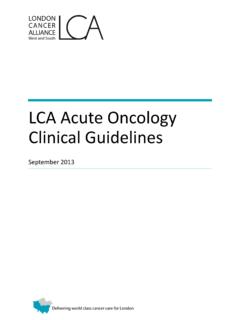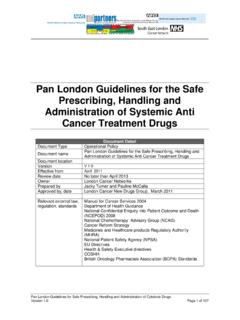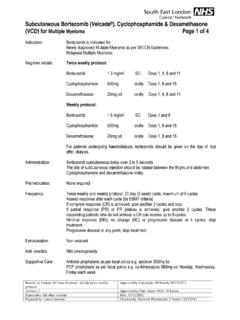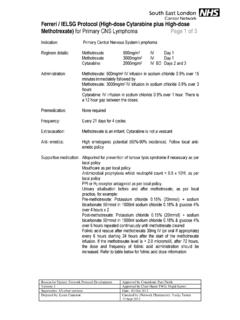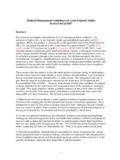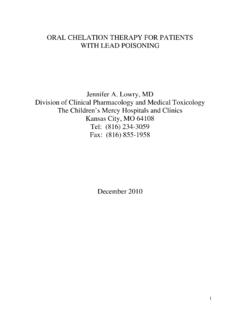Transcription of LCA Breast Cancer Clinical Guidelines 2016
1 LCA Breast Cancer Clinical Guidelines October 2013 (updated March 2016) CONTENTS 2 Contents Introduction .. 5 Executive Summary .. 7 1 Patient-centred Care and the Multidisciplinary Team .. 9 Minimising delays .. 9 Referrals between multidisciplinary teams .. 9 Communication .. 10 The Breast care team .. 10 2 Imaging .. 18 Imaging standards for evaluation of malignancy .. 18 Documentation and reporting standards .. 19 Imaging strategy for Cancer by type .. 20 Reporting interval cancers .. 24 Mismatch/discordance of screening pre-operative diagnosis and surgery .. 24 3 Breast Pathology Protocols and Guidelines .. 27 Pre-operative assessment .. 27 Surgical specimens .. 28 Histopathology reports .. 36 Biomarkers .. 37 Neo-adjuvant therapy .. 38 4 Surgical Management of Breast Cancer .
2 39 General 39 Choice of Breast operation .. 39 Breast reconstruction .. 40 Surgical management of the axilla .. 40 Surgical margins and cavity markings for Breast conservation .. 41 Axillary presentation of Breast Cancer .. 42 Ductal carcinoma in situ .. 42 Lobular carcinoma in situ .. 43 Special subgroups of Breast Cancer .. 43 Locally recurrent disease .. 44 Post-operative care and information .. 44 Risk-reducing surgery .. 45 LCA Breast Cancer Clinical Guidelines 3 5 47 Pure ductal carcinoma in situ .. 47 Invasive Breast Cancer .. 49 Adverse effects of radiotherapy .. 56 Radiotherapy in patients with collagen disease .. 58 Breast reconstruction and radiotherapy .. 58 Radiotherapy and the cardiovascular system .. 58 Inflammatory carcinoma .. 60 Radiotherapy in inoperable locally advanced disease (non-inflammatory).
3 60 Scheduling of radiotherapy .. 61 6 Systemic Therapy for Breast 65 Adjuvant and neo-adjuvant endocrine therapy .. 65 Chemotherapy .. 69 Trastuzumab .. 81 Bone health .. 86 Male Breast Cancer .. 91 Treatment and management of metastatic disease .. 91 7 Survivorship and Follow-up .. 99 99 99 Recommendations and Rationale .. 100 8 LCA Metastatic Breast Model Service Specification .. 105 9 Family History and Referral to Clinical Genetics Services .. 107 Referral criteria .. 107 Genetic testing .. 108 Management and surveillance guidance .. 109 Appendix 1: London Region Quality Assurance Reference Centre Guidance on Management of Indeterminate Breast Lesions .. 113 Appendix 2: Approved Indications for MRI of the Breast .. 120 Appendix 3: High-risk Surveillance Imaging Protocols.
4 122 Appendix 4: London Cancer Alliance Histopathology Protocol for Potentially Mismatched Breast Screening Cases .. 123 Appendix 5: Example of Breast Pathology Synoptic Proforma .. 125 Appendix 6: Breast Cancer TNM .. 127 Appendix 7: Hormone Receptor and HER2 Assessment .. 130 CONTENTS 4 Appendix 8: HER2 Protein Expression Measurement .. 131 Appendix 9: Best Practice Principles for Women Having a Mastectomy Requesting IBR .. 132 Appendix 10: IBR Best Practice pathway .. 134 Appendix 11: Algorithm for Referral to Physiotherapy for Breast Cancer Patients .. 135 Appendix 12: LCA Holistic Needs Assessment Tool .. 136 Appendix 13: NCSI Treatment Summary .. 137 Appendix 14: LCA Key Worker Policy .. 138 Appendix 15: Summary of Survivorship Recommendations .. 140 Appendix 16: LCA Metastatic Breast Service Model.
5 142 Appendix 17: Pan London Suspected Breast Cancer /Urgent Clinic Referral Form .. 143 LCA Breast Cancer Clinical Guidelines 5 Introduction The London Cancer Alliance (LCA) Breast Cancer Clinical Guidelines provide a practical multidisciplinary guide for the diagnosis, treatment and holistic care and support of Breast Cancer patients across the LCA. These Guidelines have been developed by the LCA Breast pathway Group to ensure that care throughout the LCA conforms to national and international best practice. They draw on the expertise of a range of clinicians from across the LCA s provider organisations, and subsequently reflect the wider Breast Cancer pathway . They provide evidence-based Clinical information and protocols on all aspects of the Breast Cancer pathway , while allowing sufficient flexibility to reflect good local practice and should therefore be used by clinicians to inform the treatment and care they provide.
6 These Guidelines supersede the guidance produced by the former Cancer networks in north west, south west and south east London. The Guidelines also include the new pan-London Breast Cancer urgent referral form, produced by Transforming Cancer Services London in consultation with Breast Cancer clinicians across London. The form, which incorporates the NICE 2015 guideline on recognition and referral of suspected Cancer , has been developed to improve the quality of referral from primary care and to provide the appropriate information to enable Clinical triage and support earlier diagnosis. See Appendix 17 for an example of the referral form, which can be found at: The LCA Guidelines are designed to be used by all healthcare professionals in trusts within the LCA who are involved in the care of the Breast Cancer patient.
7 They have been developed to take into account the wide range of Clinical experience of the user and the different Clinical settings in which they work. The Guidelines are intended to assist in the initial assessment, investigation and management of patients. Adoption of the LCA Guidelines will allow widespread implementation of up-to-date and evidence-based management of Breast Cancer patients, and will assist in the provision of a consistently high standard of care across the LCA. All trusts are expected to be able to provide the standard of care detailed in these Guidelines . The LCA Breast pathway Group meets regularly, and the Guidelines will be reviewed annually to ensure they are updated with emerging evidence and changes in practice. We would like to thank the following people for their contribution to the development of these Guidelines : Dr LS Wilkinson, consultant radiologist and Director of Screening, South West London Breast Screening Service, Dr Mamatha Reddy, consultant radiologist, St George s University Hospitals NHS Foundation Trust and Dr Mia Morgan, consultant radiologist, London North West Healthcare NHS Trust (imaging); Sarah E Pinder, Professor of Breast Pathology and honorary consultant Breast pathologist, King s College London (pathology); Dr Susan Cleator, Breast Clinical oncologist, Imperial College Healthcare (radiotherapy); Dr Anna Kirby, consultant Clinical oncologist, The Royal Marsden NHS Foundation Trust.
8 Dr Mark Harries, consultant medical oncologist, Guy s and St Thomas NHS Foundation Trust (systemic therapy); INTRODUCTION 6 Nicola Glover, LCA Survivorship and Mental health & Psychology project manager and AHP lead (survivorship); Kate Jones and Rebecca Brennan, AHP representatives on the LCA Breast pathway group; Dr Anjana Kulkarni, consultant in Clinical and Cancer genetics, Guy s and St Thomas NHS Foundation Trust (family history); and Falguni Raja, Senior Project Manager, LCA (LCA Metastatic Breast Model Service Specification). We would also like to thank Mairead McKenzie and Breast Cancer Care for providing a patient perspective. Dr Will Teh Chair, LCA Breast pathway Group LCA Breast Cancer Clinical Guidelines 7 Executive Summary The London Cancer Alliance (LCA) Breast Cancer Clinical Guidelines combine the best features of earlier network protocols, and have been developed in agreement with clinicians across the LCA.
9 The guidance combines evidence-based and best practice recommendations with the aim of ensuring that there are equitable high quality services across the LCA. The Guidelines are multidisciplinary and cover imaging, pathology, surgery, radiotherapy, systemic therapy, survivorship and the management of women at high risk of Breast Cancer . The imaging section (Chapter 2) outlines optimal imaging strategies for the diagnosis of Breast Cancer ; it is based on referenced published national guidance. Strategies for screening women at high risk of Breast Cancer are referenced in this section as well as in the family history section (Chapter 9). The Breast pathology guidance (Chapter 3) is more detailed than previous documents and is in line with the latest NHS Breast Screening Programme Pathology Guidelines , which are currently in preparation.
10 The surgical section (Chapter 4) is based on the Association of Breast Surgery s Surgical Guidelines for the Management of Breast Cancer1 and Oncoplastic Breast Reconstruction: Guidelines for Equitable access to immediate Breast reconstruction and the 23-hour model of care for non- Breast reconstructive surgery are priority areas for the LCA and were highlighted in the model of care recommendations. The radiotherapy section (Chapter 5) provides detailed guidance on the selective use of advanced radiotherapy techniques, including intensity modulated. Heart-sparing techniques for women treated for left-sided cancers will be introduced across the LCA service development project. Partial Breast radiotherapy by either external beam or brachytherapy, including TARGIT, is not recommended as routine treatment outside a trial on the basis of current evidence, but guidance will be regularly updated.
